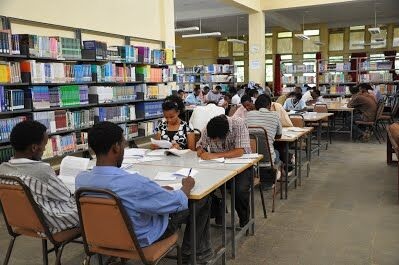
BY YOHANES JEMANEH
Sintayehu Gebru is a PhD candidate at the Addis Ababa University under the African Studies program. As his field of study is attached to media, art and culture courses, he has read various books in the area. The write of this piece met him while he was attending a book fair themed: ‘Summer time and reading’ that were held between 22 July and 16 August 2021 which was organized by Walia Book store and Zagol Book Bank. Sintayehu attends artistic and cultural programs to collect data that will help him to better understand his program and to pick out possible inputs to the research he will conduct.
He reads for various reasons such as for academic knowledge and entertainment purposes . As he has been learned from his academic life, many people specially from the developed world assumed that Africa does not have its own literature and philosophy. However, Africans had been communicating with symbols and had their own astonishing architectural knowledge even during the ancient civilization period. This assumption can be disproved by at least the written history of Ethiopia that narrates the long history of the country from Ethiopian or African perspective, he noted.
Especially in our country, a bibliophile and an academician/vulgar are poles apart. I think a graduate can be less knowledgeable than the bookworm as the first might achieve educational certificate in various means even by committing fraud and corruption, he believed.
On the contrary, a reader develops better understanding on several issues since books are windows to see things from different viewpoints. Reading is about comprehension, interrogation and honing self-discipline so that it makes a person proficient and versatile.
But then, the poor reading culture in our country has stranded nation’s overall growth mainly the socio-political ones. “On one of my special days, an individual assumed by the society as ‘insane’ told me that even a conflict is preferred with a reader person than vulgar since the first one allow opponent to take time and think about consequences and solutions. Therefore, the poor reading culture can be taken among major reasons behind the current political crisis of our country. Our generation lacks meticulousness. It rushes to practice what it heard or watched. This includes some of the ‘elite group’ as they are adding fuel to country’s problems through disseminating unreliable information impetuously talking on the media.”
Reading is a habitual action which can be developed into lesesucht. It is important to know what type of books to start with. “When you are a starter, you have to know what makes you interested, recreated, or passionate. For example, I started reading with literary fiction books and entertainment magazines. I grew listening to the narration of the most known novel of Haddis Alemayehu titled ‘Love unto the Grave on the radio’,” Sintayehu suggested.
Reading literary fiction is essential as it encourages the reader to refer more books in search of further reading on topics like folklore, psychology and history that directly or indirectly hinted in the novel. Such further analysis broadens the mind of the reader to understand complex subjects through developing the ability to breakdown concepts from vague to simplest form, he expressed.
Reading is not bad as such. The bad thing is that when you try to practice whatever we have read. In any case, if you develop the culture of reading in the aforementioned way, you will not hurt others or yourself since you have better understanding on various issues from all dimensions. “I read books to see something from other perspective. I used to read to add something on what I knew before and to make balance in my consideration. I read history, liturgy and philosophy books not to follow or apply them; jut to open the window of my mind to look life from other direction.”
We may face challenges related to time, place and economy to read books, however we can manage them by setting priority. We can read books everywhere if we have the will. There are times that we waste before we leave home for work and before we sleep. We can use them properly to read five to 20 pages at a time, Sintayehu suggested.
Everyone may have books to be read in Summer, according to Author Endalegeta Kebede. It is time to read, write, publish and meditate. He added that the book fair that had been undertaken for the past almost one month comprised of existing and new books. In this regard, 15 book stores were involved in providing books with discounts. Q & A with Authors and launching ceremonies of new books was also part of the exhibition.
The organization of such exhibitions is important to enable the reader to meet all its needs at a time by saving time, energy and finance. It helps to purchase books in item and volume with discount prices. Sintayehu believed that the presence of authors and experienced readers is also advantageous to the art community to draw lesson about strategies of reading.
Such programs are also important to get people that help the reader to be able to identify what to read. “For example, I am here to meet people and collect recommended books in my field of study with cheap price.”
Moreover, the fair encourages students and other readers to new motivation of reading. And it is significant to the literature community to attract more audience in the sphere. The fair usually takes place in summer. Sintayehu relates the schedule with closure of schools for summer break. He said the break which locally known as “Sene Selasa” is known among the students as a time to detach from schools and schoolmates for two months. They bid farewell and express best wishes till they meet next academic year.
Many notice this period as a time to take rest and read. Both students and teachers get rest in this season so that they can read either academic or other literary works. Actually, reading should be a lifetime duty to every individual, he emphasized.
On the other way, summer is silent. It is rainy outside. Everyone prefers stay at home. This makes the rainy season suitable for reading and digesting. He mentioned that summer is the time that many institutions become closed for a break so that many workers have time to read refrain from hustle and bustle.
However, there is still a poor reading culture. For Author Zenebe Wela, even the elite group favors to receive a voice message than text. Some literates prefer to be told everything than to read. For instance, they tend to hear from a messenger about one’s marriage program than reading a wedding letter. We have to promote culture of reading. We have to read at least once a day, he indicated.
A literate generation is being created these days so that reading should become a culture. He called on the government to support reading promotion and create conducive environment to this end through making policy.
In this regard, The Ethiopian Writers Association is working with the government to name July 7 a Reading Day. We are expecting the parliament to approve the draft said, Association President Abere Adamu adding that the endorsement will help to nurture a reader society.
He added that lack of interest among investors to devote capital in the area hurt the art industry in general and literature in particular. We have approximately 110 million people and at least one million readers. However, we only publish 5,000 copies. Publishing a book is very challenging due to economic and bureaucratic problems, Abere stressed.
“Books constitute the knowledge that cannot be stolen or burnt. Such exhibitions promote reading culture and create conscious society.”
Music Interpreter and Addis Ababa City Culture and Tourism Bureau Deputy Head Sertse Firesibhat perceived such book fairs as important platforms to curb problems related to publishing books. Among the challenges to publish a book are absence of reading culture, meditation areas and poor sale and economy writer.
These problems can be only solved with concerted efforts of all stakeholders and organizing artistic programs like this exhibition is crucial to make sure the cooperation among these intended bodies.
THE ETHIOPIAN HERALD AUGUST 18/ 2021





